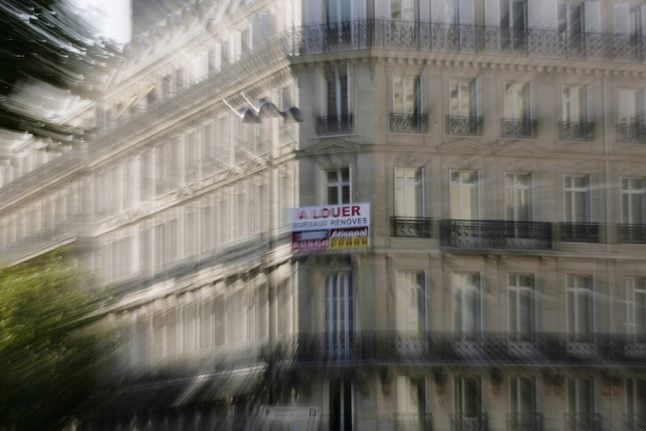There's no need to panic and stop trusting everyone but you need to have your wits fully about you when you are apartment hunting in Paris.
It can happen to anyone, even the French president's daughter. Flora Hollande, daughter of François, lost €2,400 after wiring two months' rent to a landlord in order to secure a flat she had seen online.
Sometimes the scams are so well organised that there's little the victims can do, such as the man who swindled around €10,000 out of nine different tenants for a studio in Paris. They had all visited the flat, some with their parents, spoken to the fake landlord, signed a contract and wired over the first month's rent.
These kind of scams happen with sublets, where someone already renting the apartment lets it out to someone else for a short period of time. If you sublet a flat you need to be doubly careful.
The main type of scam flat hunters in Paris and other French cities fall victim to most often sees a fake landlord ask prospective tenants to send them money to secure the flat they have advertised on a website. Once the sum has been paid, the eager renter never sees their money again and the online ad simply disappears.
Then there's the more serious scam involving identity theft which stems from handing over the infamous dossier.
READ ALSO: Ten things you need to know about apartment hunting in Paris

The dossier is the file of documents you need to put together to give to a landlord or estate agent to basically prove you will be a trustworthy and reliable tenant who will pay the rent on time.
Most agencies or property owners demand this giant folder filled with copies of IDs, bank statements, tax assessments, job contracts and lots of other fiddly documents.
It is also filled with lots of personal financial information, meaning you need to be very careful who you show it to and also how you share it.
So how can you make sure the apartment you are interested in is even real and that the person at the end of the email doesn’t intend to run off to with your identity?
According to Nadège Conger, founder of Sabbaticalhomes.com, if you are coming to Paris for a short time you should “be suspicious of a landlord who isn't interested in finding out who you are, why you are coming to Paris and how long you are staying.”
If someone is going to rent you their home, they should want to know some facts about the person they are going to let sleep in their property.
Conger also believes you should be wary ”of someone who is in a hurry to get everything settled in order to receive a deposit and rent money”.
If you are organising the apartment from abroad, you should try to connect with the person through video call, so you can have a virtual tour of the property. If they refuse, a giant red flag should be blinding your vision.
“You want to see they have access to the property,” agrees Conger. “If they tell you they can't accommodate a video call or a visit because they are travelling or because of some emergency, beware!”
It's a good sign if a landlord who advertises their flat on a paid site, rather than on free sites such as Le Bon Coin, experts say, but not fool proof that they're legit.
Email exchanges can give a lot away too. Watch out for emails where the French is badly written or when the language used is very formal and impersonal, because there is a chance a scammer is just copy-pasting lines from the internet to lure you in.
Here are our top tips to avoid scams:
Be suspicious
Especially if the landlord or departing tenant says they are abroad and are suddenly hard to contact, or someone else picks up the telephone on the number they gave you.
Be very suspicious if the landlord is ultra keen to rent to you. It's hard to find a flat in Paris and normally landlords are very picky, so there's no reason for them to be so keen to get you in.
If they try too much to reassure you that it's not a scam, it probably is.
The golden rule is: “If in doubt, walk out.”
If it sounds too good to be true, it probably is
Sometimes, the scams are easy to spot. Websites such as Craigslist or Le Bon Coin have hosted many bogus adverts. If you see a flat for €600 a month for a three-bedroom apartment beside the Louvre, it is almost certainly not a legitimate bargain, but a scam. If the pictures look straight out an IKEA catalogue that's s probably because they are. Dream flats do exist, but they come with a price tag .
Take care to check out if the photos on the ad matches the text that goes with it. If they don't, the alarm bells should go off.
Have your wits about you
If the wording in the advert rings a fishy bell with you, it is probably a kipper. If some paragraphs are in perfect English, but others are in capital letters demanding you send your email address immediately, this is probably a fake ad. Do not send your email address. A good idea is to copy paragraphs directly into Google and you can see if they have been lifted from a real ad.
Never wire money. Never ever (unless the contracts are signed)
This is a hard and fast rule, without exceptions. If you send money through Western Union or one of the other wire services, it's probably gone forever. Forget about getting it back.
No good landlord would ask you to do this, but scammers often ask for deposit money to be wired even before you have seen the flat or signed a contract.
Check them out too
It is increasingly easy to find out if someone is real or using an anonymous email account. Google their name, if they give it to you. Try to speak to them over the telephone. Fraudulent renters often use yahoo.com and hotmail.com email addresses. Be sceptical if you can’t find anything about them.
Maintain some privacy
Landlords will need to know details about you but they don’t need to know everything before they meet you. Do not give out any financial information to a stranger over the internet.
Research the street
Look up other rentals in the area, compare prices. Maybe you are getting a real bargain, but landlords and owners are normally aware of property prices in the area and will set the price accordingly.
If all the other two-bed apartments in that area are being rented out for €1700, it's unlikely you 'dream rental home' for €900 is real. Also, use Google maps to check the photographs. If there is a pic of a park out through the window and you can see there is no park in the vicinity, chances are the pics are fake.
Dossier don'ts
If you are going the official dossier route, the unbreakable rule is never, ever send it by email. If you do, you run a real risk of somebody stealing your identity and destroying your credibility and financial stability.
A giant alarm bell should ring if anyone asks you to email these documents, no reputable landlord or agent would. You must only ever hand them over in paper format to a person you have met, and consider trustworthy. This makes it difficult to find an apartment through a French agency before you arrive in Paris, but it is a crucial step.
Don't send personal details before you have seen the flat. Fake landlords looking to con you and steal your identity might ask for bank statements, copies of ID cars, proof of address or payslips before you have even spoken to discuss a rendevous to see the flat. Don't hand over a singe sheet of paper until you are sure they're the real deal.





 Please whitelist us to continue reading.
Please whitelist us to continue reading.
Member comments